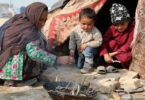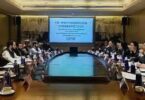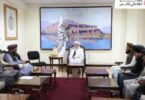KABUL (TOLO News): As the peace efforts are ongoing despite an increasing violence across the country, Acting Minister of Foreign Affairs Salahuddin Rabbani said the legal system of Afghanistan has defined certain limits for engaging into peace talks and national reconciliation process, suggesting caution when it comes to the negotiations with the Taliban who refuse to stop violence and engage in intra-Afghan dialogue.
The US and the Taliban’s talks are ongoing in Doha for more than a week but reports indicate that the two sides have not reached an agreement on the four key issues under debate which are foreign forces withdrawal, counterterrorism assurances, a ceasefire and intra-Afghan talks.
Rabbani said the Afghan government will not negotiate on some principles such as respect and protection of human rights in the peace process with the Taliban.
“The legal system of the Islamic republic of Afghanistan which is based on the Islamic principles and human rights values has defined certain limits for achieving peace and moving towards national reconciliation. Respect and protection of the principles of human rights are making the fundamental part of these limits and they are not negotiable. Therefore, in order to settle down decades of conflicts in Afghanistan, there is a need to respect the fundamental rights of all citizens, ensure public welfare development, ensure social justice and maintain the rule of law. All these principles are making our fundamental conditions in the peace talks,” Rabbani explained.
“For settling down decades of conflict in Afghanistan, there is a need to respect the fundamental rights of all citizens, honor social justice and implement rule of in the peace process,” said Rabbani at the second Afghanistan-EU Special Working Group meeting on Human Rights, Good Governance and Migration in Kabul on Thursday.
The EU officials said at the meeting that any peace with the Taliban should be acceptable to the people of Afghanistan and religious minorities.
“The Afghan people have been engaged in discussions and speculation about how peace could be achieved and what kind of peace they would like to achieve,” the First Lady Rula Ghani said. She said the main concern has been the fear about losing the achievements of the past 18 years for the peace process in the country.
“Study and experiment has shown that if women are involved in the peace process, there are much better chances that the peace settlement would be lost. We follow with interest the national women consensus for peace conference and its outcome,” said Paola Pampaloni, the Deputy Managing Director of Asia and the Pacific at the European External Action Service.
The remarks come as a scheduled meeting between the Afghan delegation and the Taliban scheduled for mid-April was delayed due to disagreements on a list proposed by the Afghan side.
Furthermore, a grand council of 3,200 delegates from around the country in a resolution after five days of consultations called on the Afghan government and the Taliban to agree on a ceasefire. President Ghani accepted the call and said the resolution of the council will turn into an action plan for the Afghan government.






